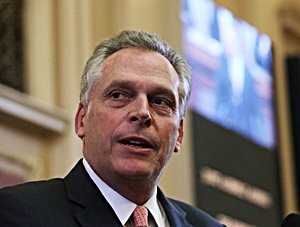McAuliffe’s ‘mystifying’ veto doesn’t bode well for campaign pledge record

By Kathryn Watson | Watchdog.org, Virginia Bureau
ALEXANDRIA, Va. — If Gov. Terry McAuliffe wants to further his campaign pledge to push tougher ethics laws — and distinguish himself as, well, not former Gov. Bob McDonnell — vetoing a bill that would have curbed his ability to take campaign cash from companies or local officials vying for economic development grants from his office probably isn’t helping.
STOPPED COLD: Gov. Terry McAuliffe vetoed a bill that would have limited campaign contributions to him from companies vying for a grant from his office.
HB 1212 and SB 650, which were rolled together and received unanimous support from both houses of the General Assembly, would have restricted the governor’s solicitation or acceptance of campaign contributions over $50 from any party competing for grants or loans from the Governor’s Development Opportunity Fund, the governor’s $35 million discretionary pot of money.
Since the fund was created in 1993, governors from Doug Wilder to Bob McDonnell have given roughly $200 million to match grants from localities to companies that meet certain job creation and capital investment requirements.
Republicans and Democrats on both sides of the aisle co-sponsored the bill to combat any symbiotic relationships between governors and wealthy donors after outrage erupted over the ties McDonnell and his wife, Maureen, allegedly enjoyed with businessman Jonnie Williams.
One campaign finance expert called McAuliffe’s move “mystifying.”
“There’s obviously a tremendous danger of corruption, and Virginia has seen, and is still seeing, how that can unfold in the case of Governor Bob McDonnell,” said Dale Eisman, a spokesman for Common Cause, a Washington, D.C.-based nonprofit organization that scrutinizes money in politics. “This legislation is clearly an attempt to cut off an avenue of corrupt influence, and it’s hard to understand why the governor would veto it, especially after all he said about trying to fight for a higher standard in Virginia.”
In the wake of the McDonnell scandal, McAuliffe campaigned on a platform of more rigorous ethics.
“Virginians deserve better than to have their leaders just say ‘Trust me’ while having no real accountability,” candidate McAuliffe said one year ago when he was proposing the creation of an ethics commission.
McAuliffe took the initiative to impose a gift cap on himself and his family members through executive order. Still, while most of McAuliffe’s executive orders last at least as long as his term, he set that one to expire after one year, as Watchdog.org reported first.
After four months, his office still has yet to answer whether the governor will renew the executive order.
Brian Coy, spokesman for the governor, didn’t return Watchdog.org’s request for comment on the veto.
Delegate Scott Surovell, one of the bill’s co-sponsors, said he doesn’t believe quid-pro-quo is happening with the Governor’s Opportunity Fund. He analyzed every grant administered under the McDonnell administration.
“I’ve seen no evidence that political contributions or gifts have played any part in Governor’s Opportunity Fund grants,” he said.
When Surovell spoke with Virginia Economic Development Partnership officials, who handle much of the application process, they told him the governor typically doesn’t intervene much in the process.
Still, since candidates for public-private transportation projects can’t donate to the governor during the application process, Surovell said the same should apply to GOF applicants.
In his veto explanation, McAuliffe said he wanted to “protect confidentiality for ongoing economic development projects.”
Eisman said that doesn’t make sense, since only the governor and his staff members know which projects are in the running.
Lawmakers killed the governor’s earlier amendments that would have included themselves in the restrictions, contending they have no insider information or decision-making power when it comes to the Governor’s Development Opportunity Fund — that’s why it’s called the Governor’s Development Opportunity Fund.
That rejection, in part, is why McAuliffe said he vetoed the bills.
Eisman, however, said that shouldn’t stop McAuliffe from setting a standard now and working on legislative restrictions in the future.
The relationship between politicians with the power to dole out cash and the company executives with the cash to benefit those politicians is all too natural, said Eisman, who, as a representative of Common Cause, advocates eliminating corporate cash from politics entirely.
“This is kind of analogous to when a relative does something nice for you,” Eisman said. “Grandma sends a check for your birthday and you want to do something nice for her. These are personal relationships.”
— Kathryn Watson is an investigative reporter for Watchdog.org’s Virginia Bureau, and can be reached at kwatson@watchdog.org, or on Twitter @kathrynw5.







